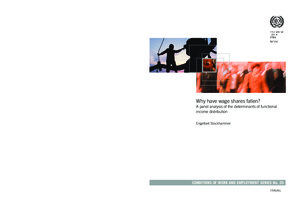Why have wage shares fallen? A panel analysis of the determinants of functional income distribution
"Wage shares have fallen substantially over the past 25 years. This is part of a trend towards increasing inequality. In the OECD countries the (adjusted) wage share declined by almost ten percentage points. While the development of income distribution in developing countries is more heterogene...
| Main Author: | |
|---|---|
| Institution: | ETUI-European Trade Union Institute |
| Format: | TEXT |
| Language: | English |
| Published: |
Geneva
2012
ILO |
| Subjects: | |
| Online Access: | https://www.labourline.org/KENTIKA-19129748124919479209-Why-have-wage-shares-fallen?-a.htm |
| Summary: | "Wage shares have fallen substantially over the past 25 years. This is part of a trend towards increasing inequality. In the OECD countries the (adjusted) wage share declined by almost ten percentage points. While the development of income distribution in developing countries is more heterogeneous, wage shares have, on average, also declined there and personal income distribution has become more unequal. As a consequence, there has been a renewed interest in the determinants of functional income distribution. There are a number of empirical studies on the determinants of the wage share in OECD countries (IMF 2007a, EC 2007), but few studies on developing countries (Jayadev 2007, ILO 2011). This study uses a new ILO/IILS dataset on adjusted wage shares for a large group of developing and advanced economies to explain changes in wage shares and assess
the relative contributions of technological change, financialisation, globalisation and welfare state retrenchment. We find strong negative effects of financialisation as well as negative effects of welfare state retrenchment and globalisation. Technological change has had a positive impact on wage shares in developing economies, but a (modestly) negative one in advanced economies. We find that globalisation (in production) has robust negative
effects, even in developing economies." |
|---|---|
| Physical Description: | 61 p. Digital |

